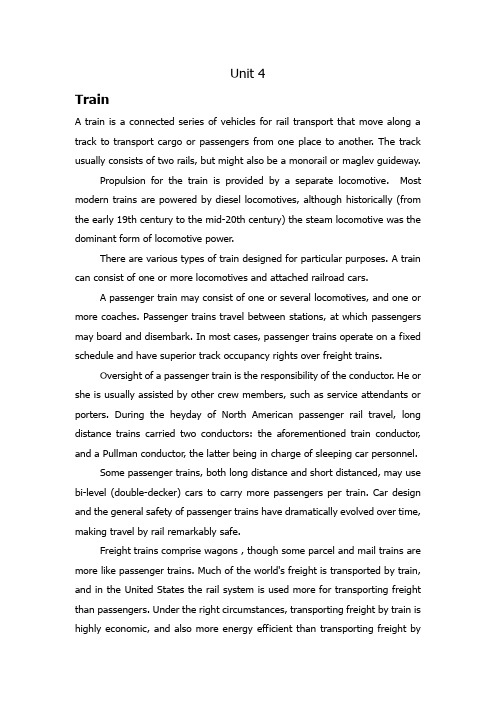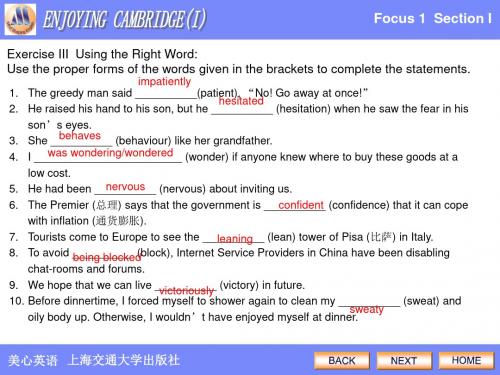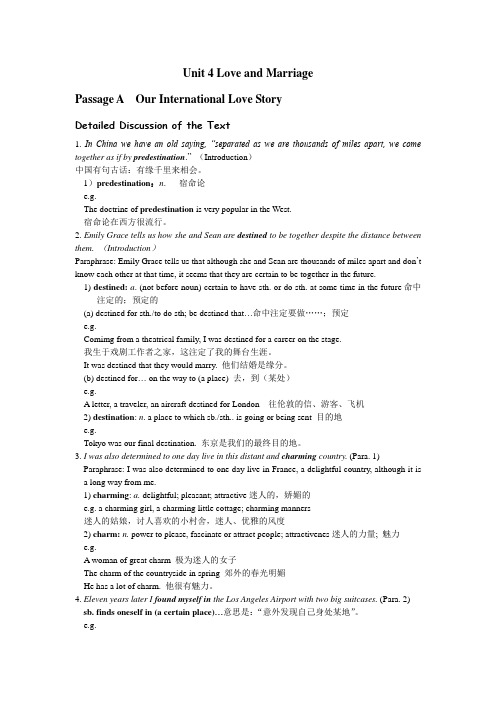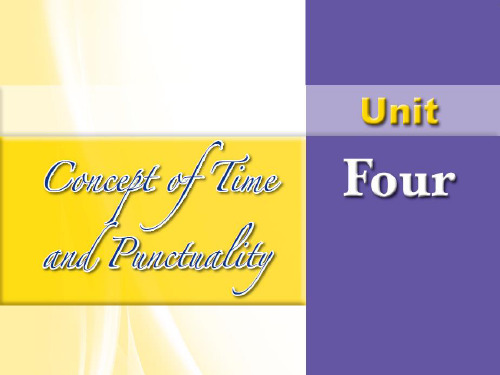实用英语unit4
高职高专实用英语Unit 4课文+译文

Unit 4TrainA train is a connected series of vehicles for rail transport that move along a track to transport cargo or passengers from one place to another. The track usually consists of two rails, but might also be a monorail or maglev guideway.Propulsion for the train is provided by a separate locomotive. Most modern trains are powered by diesel locomotives, although historically (from the early 19th century to the mid-20th century) the steam locomotive was the dominant form of locomotive power.There are various types of train designed for particular purposes. A train can consist of one or more locomotives and attached railroad cars.A passenger train may consist of one or several locomotives, and one or more coaches. Passenger trains travel between stations, at which passengers may board and disembark. In most cases, passenger trains operate on a fixed schedule and have superior track occupancy rights over freight trains.Oversight of a passenger train is the responsibility of the conductor. He or she is usually assisted by other crew members, such as service attendants or porters. During the heyday of North American passenger rail travel, long distance trains carried two conductors: the aforementioned train conductor, and a Pullman conductor, the latter being in charge of sleeping car personnel.Some passenger trains, both long distance and short distanced, may use bi-level (double-decker) cars to carry more passengers per train. Car design and the general safety of passenger trains have dramatically evolved over time, making travel by rail remarkably safe.Freight trains comprise wagons , though some parcel and mail trains are more like passenger trains. Much of the world's freight is transported by train, and in the United States the rail system is used more for transporting freight than passengers. Under the right circumstances, transporting freight by train is highly economic, and also more energy efficient than transporting freight byroad. Rail freight is most economic when freight is being carried in bulk and over long distances, but is less suited to short distances and small loads.译文列车列车是铁路运输中连接起来的一组车辆,它们在轨道上行驶,从一地向另一地运输旅客或货物。
实用英语第一册unit4课后答案

a. The kid __w_e_n_t__ into his room and shut the door. b. She tried to blow out all the candles on the cake in one __g_o_. (3) rest n. & vi. a. You may take a __r_e_s_t __ after that class. b. I see a bird __r_e_st_in_g_ on the roof. (4) drink n. & vt. a. Are there any soft _d_r_in_k_s__ in the refrigerator? b. She __d_r_in_k_s_ milk before going to bed every night. (5) feel n. & vi. a. I _a_m_ not __fe_e_l_in_g_ well now, so I can’t dine out with you. b. The _______ of the meeting is tense.
美心英语 上海交通大学出版社
Focus 1 Section I
Exercise VII.1 Translation: Translate the following sentences into Chinese. (1) She’s been dating him for months but she’s still not very serious. 她__跟_他__约__会__几__个_月__了__,__但__她__还_不__是__很__认__真_。____ (2) Tom came close to falling off the high wall. 汤__姆__差__点__从_高__墙__上__跌__下__来_。________________ (3) He goes for the world record. _他__想_创__造__世__界__纪_录__。______________________ (4) The magician escaped from the cage with his hands tied behind his back. _魔__术_师__双__手__反__绑_着__从__笼__子__里__逃_了__出__来__。_______ (5) She must have had a cold, for she had a fever and a runny nose. 她__一__定__是__感_冒__了__,__因__为__她_发__烧__,__还__流_鼻__涕__。____
新编实用英语教案unit-4

Unit 4 Punctuality and CultureI.Teaching objectives1.Enlarge your vocabulary related to timetables and schedules.2.Make an appointment according to the timetables.3.Practice writing timetables and schedules .4.Appreciate passages and complete exercises well.5.Get some tips about the use of verb tenses.II. Key points1. Master the vocabulary about timetables and schedules.2. Understand the passages3. Practice writing timetables and schedules.4. Practice making an appointment according to the timetables. III. Difficult points1. Get some tips about the use of verb tenses.2. Practice writing timetables and schedules.3. Appreciate passages and complete exercises well.IV. Teaching methodology1.Task-based language teaching2.Direct methodV. Teaching proceduresSection I Talking Face to FaceImitating Mini-Talks1.Work in pairs. Practice the following mini-talks about schedules and timetables.Acting out the Tasks2.Work in pairs and act out the tasks by following the above mini-talks.Key for reference:1)Task:Look at the flight timetable in Exercise 3. Ask about the departure and arrival time.2)Task:Look at the flight timetable in Exercise 3 .Ask about the Tuesday flight for Hong Kong.3)Task: Look at Mark’s schedule in Exercise 3. Call to ask Mark for a change of an appointment.4)Task:Look at Mark’s schedule in Exercise 3. Ask to make an appointment to see Mark on Wednesday.5)Look at Mark’s schedule in Exercise 3. An old friend in Hong Kong asks to see Mark on Thursday .Studying Timetables and Schedules3.Timetables and schedules a re important in planning our activities. Read the following timetable and schedual and try to use the information to practice short dialogues.Following Sample Dialogues4. Read the following sample dialogues and try to perform your own tasks. Putting Language to Use5. Mark is going to Harbin to see the Ice Lantern Exhibition. He is asking Miss Wang to help him to find out about the train timetable. Suppose you are Mark. Read aloud the following dialogue with your partner by putting in the missing words.6. Now imagine you are a receptionist in a hotel. Mr. Johnson is asking you about information of your hotel. Fill in the blanks according to the clues given in the brackets. Then act it out with your partner.Section II Being All EarsLearning Sentences for Workplace Communication1.Listen to 10 sentences f or workplace communication cross-referenced w ith their Chinese translations.Script: (e.g) 1). Would you please arrange a meeting for me with Dr. Johnson?2). I’d like to make an appointment to see Mr. Black.3). I’d like to confirm our meeting tomorrow afternoon.4). The train is due to arrive at 9 o’clock, but it has been delayed for one hour.5). I’d like to see you tomorrow if you have time.2.Listen to the following sentences for workplace communication in Column A and match each one with its Chinese version in Column B.3.Listen to 6 sentences f or workplace communication and choose their right responses.Handling a Dialogue4.Listen to a dialogue and decode the message by filling in Susan’s schedule according to what you have heard.Understanding a Short Speech/Talk5.Now listen to a short speech/talk and fill up the blanks according to what you have heard.The words in brackets will give you some hints.6.Listen to the speech/talk again and complete the information in Column A with the right choices in Column B.Section III Trying Your HandPracticing Applied Writing1.Fill in the office hours making use of the information in the passage t hat follows.2.Translate the following schedule into Chinese, using the data bank in the Workbook for reference.3.Write an English schedule for the coming week according to your circumstances.Writing Sentences and Reviewing Grammarplete the following sentences, using the right verb forms.5.Correct the errors in the following sentences.6.Translate the following sentences into English.1)This is the most interesting novel he has ever written.2)The students were still laughing when the teacher came into the classroom.3)I haven’t finished the book yet, so I don’t want to return it to the library.4)Is this the first time you have come to China?5)Even if it rains in the afternoon, I will go downtown with you..6)I didn’t hear what you said just now. I was watching TV.7)I know Mr. Wang is living in Nanjing at the moment.8)The little town lies at the foot of a mountain.Write and Describe a Picture7. Suppose this is your schedule for the coming three days. Write a paragraph of about 100words based on the information given in the schedule. You may start the passage with the sentence: I’ve got a very busy schedule.Section IV Maintaining a Sharp EyePassage onenguage Points:A.Explanation of Difficult Sentences1)One of the cultural differences that tend to annoy Americans has to do with understanding of punctuality.Analysis:Has to do with is a phrase meaning has a special relationship with. It is the predicate of the sentence. That introduces a restrictive relative clause modifying differences.2)Arriving at my office 30 minutes after the appointment , I found a voice message telling me the team was waiting for me in the meeting room. Analysis: Arriving at... is a present participle phrase used as an adverbial of time. Telling me(=that told me)is a present participle phrase modifying message. The team was waiting for me in the meeting room is the object clause of the verb telling with that omitted.3)Being afraid that I had missed the appointment , I hurried in, and found them happily chatting together.Analysis:Being afraid that I had missed the appointment is a present participle clause used as an adverbial of cause. Chatting is a present participle used as the object complement.4)...if you start late you won’t be able to finish the business at hand without running beyound the scheduled ending time.Analysis:If introduces an adverbial clause of condition. Note that the pattern you won’t be able to ...without running beyound means you will... by running beyound...B.Important Words1)punctuality n. the quality of adhering to an appointed time2)pay v. be worth it3)annoy v.to disturb or irritate especially by repeated acts4)punctual a.arriving exactly at the time appointed5)attitude n. a mental state involving feelings, beliefs and values6)behavior n.manner of acting2.Passage Translation3.Read and Think: Answer the following questions according to the passage.4.Read and Complete1)Complete each of the following statements with words or phrases from thepassage.2)Fill in the blanks with the proper words or expressions given below,changing the form if necessary.5.Read and Translate6.Read and SimulatePassage twonguage Points:A.Explanation of Difficult Sentences1)Those traveling or doing business abroad should always find out the answer to this question.Analysis: traveling or doing business abroad (=who travel or do business) is a present parciple clause used as the post-modifier of those.2)It is also supposed etiquette to arrive a little late for a party, which I have never ever understood.Analysis:supposed is a past participle, used as an adjective here. Which introduces a non-restrictive relative clause and which itself refers to the whole main clause.3)... When a bridge or major high way shuts down, there may not be any way to get where you are going.Analysis: the infinitive phrase to get where you are going is the post-modifier of the noun way.4)So I would have to say that I am always early, except when I can’t get there at all, in which case I will call as soon as I know I am going to be late. Analysis: In the object that-clause, except introduces a when- clause, an adverbial clause of time, indicating an exceptional situation. In which case introduces a non-restrictive relative clause,which refers to the exceptional when-clause.B. Important Words1)standard n. a basis for comparison; a reference point agaist which other things can be evaluated2)etiquette n.the formal rules for polite behaviors3)suppose v. to believe especially on uncertain or tentative grounds; used to say what was or is expected or intended to happen4)absolutely ad. completely and in every way5)insult n./v. A remark or action that is offensive or deliberately rude; to offend someone by saying or doing something they think is rude6)case n. an example of a particular situation , problem, etc.2.Passage Translation3.Read and Judge: True/False4.Read and Translate: Translate the following sentences into Chinese.1)按照美国人的标准,巴西人不算守时。
新风尚大学实用英语第三册课后练习答案for Unit 4

Unit 4 Love and MarriagePassage A Our International Love StoryDetailed Discussion of the Text1.In China we have an old saying, “separated as we are thousands of miles apart, we come together as if by predestination.”(Introduction)中国有句古话:有缘千里来相会。
1)predestination:n.宿命论e.g.The doctrine of predestination is very popular in the West.宿命论在西方很流行。
2. Emily Grace tells us how she and Sean are destined to be together despite the distance between them. (Introduction)Paraphrase: Emily Grace tells us that although she and Sean are thousands of miles apart and don’t know each other at that time, it seems that they are certain to be together in the future.1) destined: a. (not before noun) certain to have sth. or do sth. at some time in the future命中注定的;预定的(a) destined for sth./to do sth; be destined that…命中注定要做……;预定e.g.Comimg from a theatrical family, I was destined for a career on the stage.我生于戏剧工作者之家,这注定了我的舞台生涯。
前景实用英语unit4sportsmanship

Part A Text
On the Meaning of Sports
I have never been a sporty guy. When I was a kid, whenever we played soccer in the neighborhood, the most prestigious position was the offense. Everyone wanted to be the attacker, but only the kids claiming to be the best could play it. I was always stuck with the position of defense, or sometimes even worse, playing the goal-keeper.
Part A Lead in
Task 3 Discuss the following questions.
1. Why do you think people like sports?
Cues: healthy, shape one’s body, teamwork
2. Have you done any crazy things for your idol?
tomorrow morning. The World Cup Final starts at ___2_:0_0___. W: Oh, fair enough. Is the final between Spain and the Netherlands? M: Right. I ___b_e_t___ Spain will win. W: I’m for the Netherlands. M: We’ll see. Hey, why not ___j_o_in___ me hours later? It’ll be more fun. W: I guess so. OK, I’m in. I’ll go to get some sleep. M: Great.
新风尚高职高专实用英语综合教程unit4

piles
◆ squirrels piling up nuts against the winter.
Para. 5
• Adjusting to life in the U.S. would be far more difficult for Da Fang and Da Yao than for Yao Ming. Neither parent spoke English. In Shanghai, they lived in the heart of the city, never more than a short bicycle ride from their favorite markets, shops and friends. In Texas they were stuck in an isolated community far outside the Houston city limits – with no means of escape.
Language Points
Para. 1. Difficult Words
1. dream of / about: imagine( something / doing something) 想象,梦想
◆ I dream of a world of peace and goodwill to
all. ◆ Everyone likes to dream of being rich or famous, or both.
2.pile up: ①. to accumulate, as money, debts, evidence, etc. ◆ We carried on experiments one after another and piled up experience and data as well.
民航客舱服务实用英语-Unit-4 Beforce Take-off 1

4
wrong seat.
5 A passenger wants to take another seat.
A passenger wants 6 to upgrade.
Exercises
A passenger's seat number is 6A. How can the cabin attendant help him find his seat?
英汉互译
空闲的座位 flight attendant seat headrest (座位的)靠手,扶手 乘客座位 cockpit crew seat 座椅靠背
1
Dialogue 1
Please go down this aisle. Your seat is on the right.
T舱为普通舱55折, X舱为普通舱50折(含学生、长者(年满55周岁的中国大陆 公民)),
U舱为普通舱45折, E舱为普通舱40折, W舱为普通舱35折, R舱为普通舱30折, O舱为普通舱25折, Z舱为代码共享留座专用舱, V舱为常旅客专用舱(国航知音卡旅客订座), G舱为普通舱免折和常旅客免票
Announcements
Flight information Recheck Boarding Pass Recheck
Supplementary Reading
Questions: What kinds of seats are provided for both
passengers and crew?
飞机舱位
飞机舱主要分为头等舱、 商务舱、 经济舱。 通常价格以头等舱最高,其 次商务舱,最低为经济舱。
飞机安排座位时是分舱位的,而不同的舱位对应的机票折扣不同,价格不 同所得到的服务也不一样。平时订机票航空公司也会有不同的舱位。
新编实用英语教程Unit4

方便的
Unit | Four
3) Asking to Change the Appointment with Dr. Johnson A: I'd like to change the appointment with Dr. Johnson from Tuesday to Thursday. B: I'm afraid he won't be available on Thursday morning. A: What time would be convenient for him? Will 2 p.m. do? B: Yes, that'll be fine. 4) Asking About the Working Hours of a Ticket Office A: What are the office hours? 办公时间,营业时间 B: Well, the office office hours hours are from 9 a.m. to 6 p.m. A: Do you work on weekends? B: On Saturday the office is open from 9 a.m. to 3 p.m., but on Sunday we are closed. Macao 5) Asking About the Flights for Macao A: Do you have flights to Macao? B: We have only one flight to Macao each week, at 1:40 p.m. Wednesday. A: When does it arrive in Macao? B: At 3:40 p.m. 澳门
- 1、下载文档前请自行甄别文档内容的完整性,平台不提供额外的编辑、内容补充、找答案等附加服务。
- 2、"仅部分预览"的文档,不可在线预览部分如存在完整性等问题,可反馈申请退款(可完整预览的文档不适用该条件!)。
- 3、如文档侵犯您的权益,请联系客服反馈,我们会尽快为您处理(人工客服工作时间:9:00-18:30)。
Task III
Let's analyze paras. 1-4 in details.
Warm up
Text
Exercises
Fun Time
Para. I
Culture is an entire way of life of a society, or of a people.
anWthhroospeoildoegais?t
Para.III Learned behaviour
... we learn some of the ways of our culture by being taught by our teachers or parents.
— ... we learn some of the ways of our culture in school or at home.
Warm up
anthropologist [,æ nθrə'pɑlədЗIst]
Text
Exercises
Fun Time
Task I
Read paras. 1-4 and find out the concept of "culture".
a. an entire __w_a_y__ of life of a society, or of a people;
Warm up
Text
Exercises
Fun Time
pattern: 模式;图案;样品 n. the way in which something happens or develops
e.g.
The illness is not following its usual pattern.
The child showed a normal pattern of development.
Warm up
Text
Exercises
Fun Time
We learn more of the ways of our culture by growing up in it.
— We learn more of the ways of our culture by living in this culture seeing how other people do things and following them.
at one time: at the same time; together
Warm up
Text
Exercises
Fun Time
Paraphrase
— ... and how many people we can marry at the same time are all related to our culture.
New Term
Warm up
Text
Exercises
Fun Time
How was your winter holiday?
Text
Exercises
Fun Time
Playing fireworks
Text
Exercises
Fun Time
Pasting Spring Couplets
Text
Exercises
Fun Time
Spring Festival Gala
Warm up
Text
Exercises
Fun Time
sheep
ram
goat
Culture
1. What is the general meaning of the word"culture " ?
2. What does the word "culture"mean for those who study humankind ?
To an anthropologist the word culture means all the ways in which a group of people act, dress, think, and feel.
Warm up
Text
Exercises
Fun Time
People have to learn the cultural ways of their community: they are not something that the people in the group are born with .
F 2. Unlike other animals, spiders can do things instinctively.
F
3. Without teachers or parents, we’ll never know the ways of doing things.
T 4. People learn the ways of their culture not only by being taught but also by growing up in it.
Warm up
Text
Exercises
Fun Time
Translation :
然而,他们满足这些需要的方式取决于他们 成长于其中的文化。
Warm up
Text
Exercises
Fun Time
...and how many people we can marry at one time are all parts of our culture.
Warm up
Text
Exercises
Fun Time
Homework
Read text A after class and finish exercise 2 on P81
My new plan of this term is …
Warm up
Text
Exercises
Fun Time
The End!
T 5. What is regarded as a natural way of doing things in one culture may not necessarily mean the same in another culture.
Warm up
Text
Exercises
Fun Time
b. learned behaviour rather than _in_s_t_in__c_ti_v_e behaviour;
c. different cultures with different __p_a_t_te__rn__s__of life.
Warm up
Text
Exercises
Fun Time
Warm up
Text
Exercises
Fun Time
Para.IV
Basic needs
Warm up
Text
Exercises
Fun Time
However, the way in which they take care of these needs depends on the culture in which they grow up.
Warm up
Text
Exercises
Fun Time
another meaning For example, we sometimes say that people who know about art, music, and literature are cultured.
cultured: a. intelligent, polite, and interested in art, literature, music etc.有教养的,文雅,有 修养的
Culture is a learned behaviour rather than an instinctive behaviour
Warm up
Text
Exercises
Fun Time
Para.II
What is instinctive behaviour?
Instinctive behaviour, on the other hand, is a pattern of behaviour that an animal is born with.
Exercises
Fun Time
pasting paper-cut
Text
Exercises
Fun Time
New clothes
Text
Exercises
Fun Time
Calling on relatives
Text
Exercises
Fun Time
Red packet
Warm up
Text
Task II
Read this whole passage and try to decide whether the statements are True (T) or False (F) according to the passage.
T
1. The general meaning of the word “culture” is different from the one given by anthropologists.
___行__为__模__式___ 家庭模式 _______布__料__的__图__案_____
墙纸的图案
Which animal does the author give us as an example ?
